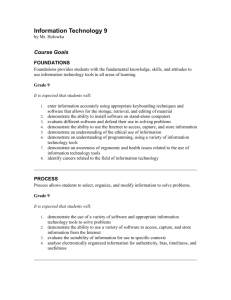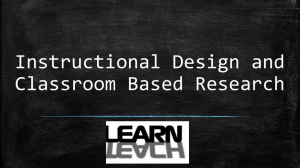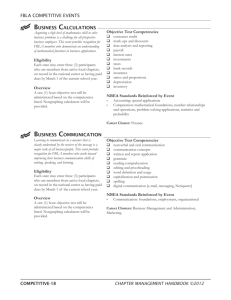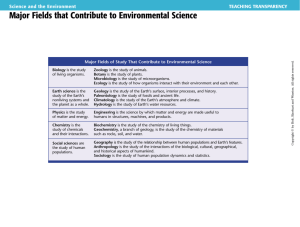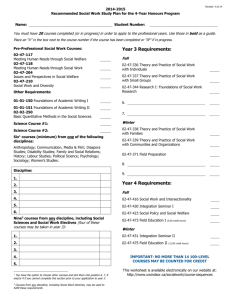Biology
advertisement
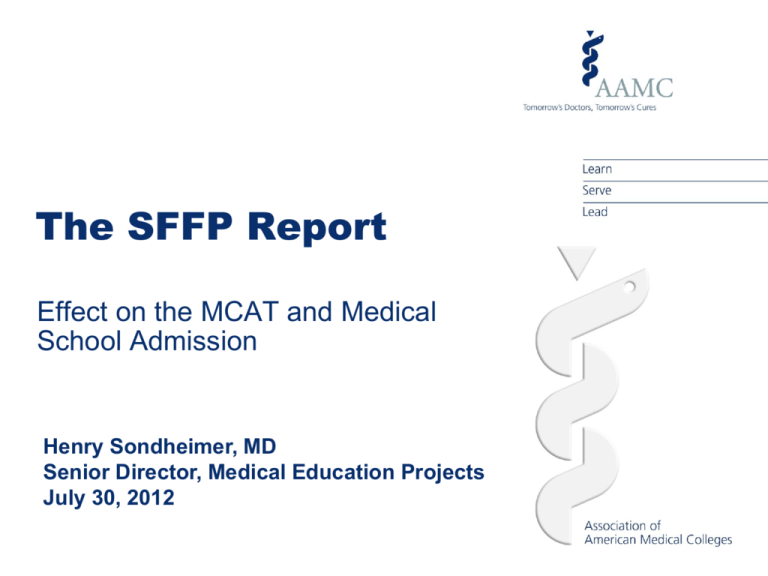
The SFFP Report Effect on the MCAT and Medical School Admission Henry Sondheimer, MD Senior Director, Medical Education Projects July 30, 2012 Agenda • • • • How we got to MCAT2015 Components of the new test Competency Based Admissions Pre-requisites in the interim Transforming Admissions • Transforming admissions to keep pace with changes in science and medical education • Preparing a physician workforce to improve the health of all Blue-ribbon Panel Reports Scientific Foundations for Future Physicians Report (2009) Roadmap to Diversity: Integrating Holistic Review Practices (2010) Behavioral and Social Science Foundations for Future Physicians (2011) SFFP Entering Competencies 1. Apply quantitative reasoning and appropriate mathematics to describe or explain phenomena in the natural world. 2. Demonstrate understanding of the process of scientific inquiry, and explain how scientific knowledge is discovered and validated. 3. Demonstrate knowledge of basic physical principles and their applications to the understanding of living systems. 4. Demonstrate knowledge of basic principles of chemistry and some of their applications to the understanding of living systems. 5 SFFP Entering Competencies 5. Demonstrate knowledge of how biomolecules contribute to the structure and function of cells. 6. Apply understanding of principles of how molecular and cell assemblies, organs, and organisms develop structure and carry out function. 7. Explain how organisms sense and control their internal environment and how they respond to external change. 8. Demonstrate and understanding of how the organizing principle of evolution by natural selection explains the diversity of live on earth. 6 Evidence Base for MCAT2015 Fact-finding efforts: • Blue-ribbon panels • Holistic Review Project Advisory Committee • Over 90 Outreach events • Over 2700 completed Behavioral surveys and Social Science Foundations for Future Physicians Roadmap to Diversity: Integrating Holistic Review Practices Scientific Foundations for Future Physicians Report 5.0 4.5 Mean Rating 4.0 3.5 3.0 2.5 2.0 1.5 1.0 8 4.12 3.34 2.26 4.27 3.12 4.47 3.07 4.19 2.96 2.91 2.77 1.82 1.8 2.14 1.54 4.5 4.33 1.65 4.3 4.01 I 2.7 1.67 2.59 1.97 Combining Skills and Concepts Foundational Concept 1 Content Category 1A Content Category 1B Content Category 1C Foundational Concept 2 Content Category 2A Content Category 2B Content Category 2C Skill 1 Skill 2 Skill 3 Skill 4 • Each cell represents the point at which foundational concepts, content categories, and scientific inquiry and reasoning skills cross • Test questions are written at the intersections of the content and skills 9 MCAT2015 – 4 Sections, 4 Scores 10 Biological & Biochemical Foundations of Living Systems Chemical & Physical Foundations of Biological Systems Psychological, Social, & Biological Foundations of Behavior Critical Analysis & Reasoning Skills Biological & Biochemical Foundations of Living Systems Concept 1 • Biomolecules have unique properties that determine how they contribute to the structure and function of cells, and how they participate in the processes necessary to maintain life. 11 Concept 2 • Highly-organized assemblies of molecules, cells, and organs interact to carry out the functions of living organisms. Concept 3 • Complex systems of tissues and organs sense the internal and external environments of multi-cellular organisms, and through integrated functioning, maintain a stable internal environment within an ever-changing external environment. Biological & Biochemical Foundations of Living Systems Foundational Concept 2 • Highly-organized assemblies of molecules, cells, and organs interact to carry out the functions of living organisms. 12 Chemical & Physical Foundations of Biological Systems Concept 4 • Complex living organisms transport materials, sense their environment, process signals, and respond to changes using processes that can be understood in terms of physical principles. 13 Concept 5 • The principles that govern chemical interactions and reactions form the basis for a broader understanding of the molecular dynamics of living systems. Chemical & Physical Foundations of Biological Systems Concept 4 • Complex living organisms transport materials, sense their environment, process signals, and respond to changes using processes that can be understood in terms of physical principles. 14 Psychological, Social, & Biological Foundations of Behavior Concept 6 Concept 7 Concept 8 • Biological, psychological, and sociocultural factors influence the ways that individuals perceive, think about, and react to the world. • Biological, psychological, and sociocultural factors influence behavior and behavior change. • Psychological, socio-cultural, and biological factors influence the way we think about ourselves and others. 15 Concept 9 • Cultural and social differences influence wellbeing. Concept 10 • Social stratification and access to resources influence wellbeing. Psychological, Social, & Biological Foundations of Behavior Concept 7 • Biological, psychological, and socio-cultural factors influence behavior and behavior change. 16 Critical Analysis & Reasoning Skills Asks examinees to critically analyze, evaluate, and apply information presented in passages from humanities & social sciences, including: • Ethics • Philosophy • Population health • Cross-cultural studies Specific disciplinary knowledge not needed 17 Testing and Course Completion Some examinees test for the first time as juniors, some as seniors, and some later: • Juniors 41% • Seniors 27% • Later 27% Before testing, many examinees complete biochemistry, psychology or sociology: • Biochemistry 63% • Introductory psychology 65% • Introductory sociology 32% 18 Applying to Medical School Some apply after junior year, some after senior year, and some while in post-bac or grad school: • As college seniors 37% • During gap year 44% • Post-bac or grad school 19% Many medical schools require or recommend biochemistry or a behavioral or social science course: • 83% biochemistry • 53% behavioral or social science 19 Where we are headedCompetency Based Admissions Competency-Based Admissions • Competency-Based Admissions (CBA) is an approach to admissions that employs processes intended to determine each applicant’s ability to demonstrate a core set of entry-level competencies needed to succeed in medical school, residency and in practice. • This core set of entry-level competencies includes both: • Interpersonal and intrapersonal competencies • Academic competencies COA-Endorsed Personal Competencies Category Competencies Interpersonal •Service orientation •Social and interpersonal •Cultural competence •Team work •Oral communication Intrapersonal •Integrity and Ethics •Reliability and dependability •Resilience and adaptability •Capacity for improvement The Prerequisite Landscape During the Transition to the 2016 Entering Class Application Cycle What are medical schools doing? • 75% of schools that responded to a survey indicated a willingness to create less-restrictive pathways. • 43% of respondents answered “No” or “Sometimes” to the question: “If an applicant does not meet your school's premedical course requirements, are they excluded from the applicant pool?” • How schools create and show their flexibility will likely vary from school to school. Schools with no required courses • Hofstra North Shore—LIJ School of Medicine • Medical University of South Carolina • Raymond and Ruth Perelman School of Medicine at the University of Pennsylvania • Southern Illinois University School of Medicine • University of Cincinnati College of Medicine • University of Virginia School of Medicine Southern Illinois University Hofstra – Northshore LIJ University of Pennsylvania University of Pennsylvania: Guidance to Applicants English/Communications Competence in writing, speaking, and reading the English language Biology Understanding of the basic biological principles shared by all living organisms Chemistry Understanding of the core principles of physical, inorganic, and organic chemistry Physics and Mathematics Firm foundation in mathematics and physical science on which the medical science…can be based Other Acquisition of an education that leads to continuous, lifelong learning http://www.med.upenn.edu/admiss/admissions1.html Other Current Models of Flexibility • Schools that don’t require organic chemistry: • University of Minnesota Medical School • Cooper Medical School of Rowan University • Schools that don’t require inorganic chemistry: • Central Michigan University College of Medicine • University of Rochester School of Medicine and Dentistry • Northeast Ohio Medical University • Schools with parallel pathways: • Harvard Medical School Harvard Medical School Harvard Medical School: Changing course requirements “Interdisciplinary courses that break down the barriers among, demonstrate complementary concepts of, and highlight collective wisdom in biology, chemistry, physics, and mathematics are encouraged.” http://hms.harvard.edu/content/requirements-admission Next steps • The AAMC is recommending that medical schools reassess their current prerequisite course requirements with a focus on creating the least-restrictive pathway for applicants.
